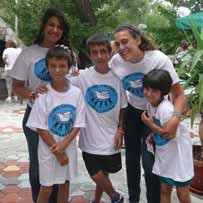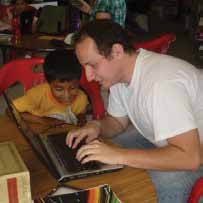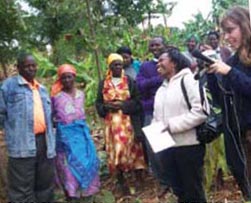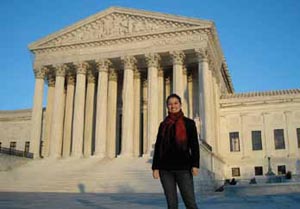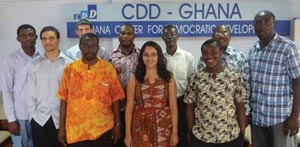Guadalupe Guerrero picks raspberries for a living in the fields of Watsonville. Until recently, she could not use a computer.
For many of us who do use computers, our digital lives have become almost as vivid and important as our real-world ones. In our intricately connected society, being shut out from the online world is greatly limiting, and the space between those with access and without is a growing divide.
"Technology has been revolutionary in every aspect of our lives," UCSC sociology professor Paul Lubeck says. "Economic opportunity is increasingly dependent on using these technologies."
Guerrero has now leaped the divide. Today she has a website for her burgeoning bakery side business. She uses YouTube to learn new baking techniques and Facebook to post photos of her cakes and communicate with family in Mexico. She checks her daughter's grades online.
"She's comfortable with the computer now," says daughter Ebelin Mata, 14, a Watsonville High School sophomore.
Ebelin and Guerrero are both clients of the UCSC Global Information Internship Program (GIIP), a unique undergraduate social justice venture: GIIP guided Guerrero into the digital world, and they recently organized a technology camp on the UCSC campus, where Ebelin and other Watsonville-area Latino high school students learned to develop mobile apps and navigate the ins and outs of college applications.
Tech consultants to nonprofits
GIIP's project in Watsonville is just one of many the program has developed around the world. Nonprofit organizations have limited resources and often can't take advantage of existing technology that could greatly improve their efficiency. GIIP interns identify causes close to their hearts—environmental, educational, or otherwise—and seek out nonprofit partners in those areas that need their information and communications technology services. The interns essentially act as tech consultants to their nonprofit partners, be they in Watsonville or Nigeria.
"It's an amazing thing to take someone in Africa where books are unknown, and put them on the Internet where they can see all the libraries available to them," says Lubeck, GIIP founder and director.
GIIP interns help partner nonprofits wherever technology would improve operations: interns might teach courses on basic computer programming, set up databases and websites for small organizations, or create digital videos.
Meanwhile, UCSC undergraduates who join GIIP gain skills they cannot attain in a lecture hall, such as "the ability to analyze problems facing a community and address them," says GIIP Fellow Yethzéll Díaz (College Nine '12, Latin American and Latino studies/sociology).
"People come out of GIIP knowing how to run a nonprofit—it's the equivalent of two to three years' experience of highlevel nonprofit work," says GIIP Global Advisory Board member Mark Headley (Stevenson '83, politics and economics). "It's very much in the founding spirit of UCSC: students are given a certain amount of freedom to explore."
Headley has been a long-time supporter of what he calls the "unique and inspiring GIIP experience"; he recently made a gift to the program that will establish the Dorothy E. Everett Endowed Chair and fulfill other program needs.
Field experiences in Ethiopia
When then-GIIP intern Jyesha Wren (College Ten '11, intensive sociology) arrived in Ethiopia to work with grassroots reproductive health organizations, her partners on the ground were surprised to see a young woman traveling across the world alone. They wondered how her husband (for surely a woman at the ripe old age of 25 would be married) could possibly allow this.
Wren went with a keen interest in learning about gender-based violence. The girls in one community she assisted had called for an office of women's affairs to be added to their local police station, where records of violations against women could be kept. With the handwritten forms the station was using, it was impossible to create a database; Wren developed a Microsoft Access electronic form for reporting violations and trained staff to use the program.
Wren saw firsthand the ingenuity required to go against practices ingrained in culture. The director of one organization working to eradicate female genital mutilation deployed many strategies simultaneously, recognizing that change would only come when the tides of public opinion shifted. He pushed for schools to open in places where there were none, since schools could teach reproductive health and messages of nonviolence. He promoted public weddings of brides who were "uncut," showing that brides who hadn't been mutilated were still marriageable.
Wren's field experience led to her decision to go beyond research and policy work and become a midwife. Now a UC San Francisco Masters Entry Program in Nursing student, Wren plans to create a birth and wellness center incorporating a pharmacy and shop that will make it self-sustaining, not dependent on grants for funding. It is, she concedes, a "huge vision," but GIIP has given her the confidence—and entrepreneurial acumen—to aim high.
The basics of GIIP
In 1998, when Professor Lubeck launched GIIP as an informal working group to explore how technology could be used for public good, he had no inkling how that small group would grow.
Now GIIP is an established curriculum anchored by a three-course series, during which interns come up with an idea, write a business plan, learn to design and implement a project, and apply for grant funding. They take technological workshops tailored to their project needs and skill levels. Interns who do well during their first year are invited to become Fellows, tasked with managing GIIP, teaching technology workshops, handling program publicity, and doing anything else needed. "What makes GIIP work is Fellows have power," Lubeck says.
Even after launching into the world, some alumni are later compelled to return as Executive Fellows, overseeing operations. Katie Roper (Stevenson '07, environmental studies and economics), credits GIIP as her "first taste of having total responsibility for a project that was ambitious and meaningful." She is now an Executive Fellow and GIIP's managing director.
With so much demanded of interns, Lubeck realized formal recognition was necessary to credit those who had taken on especially time-consuming enterprises; thus was the "intensive sociology" (a.k.a. Global Information and Social Enterprise Studies [GISES]) major/minor born, with support from the sociology department. GISES majors complete an honors-quality information technology project and document in detail their experiences. Fifteen GISES majors and minors graduated last year.
Flexibility in the real world
The city of Cairo, Egypt, has no formal recycling program. Instead, there are "garbage villages," whole communities that make their living from selling the recyclables they find among the garbage of Cairo residents. Men from the garbage villages roam around the city collecting trash and bring it back to the village, where women and children sort through the piles, picking valuables from rotting organic waste.
One woman, Lydia Marcos, started an NGO to help a small garbage village bring in infrastructure like water pipes. Marcos got to chatting with her friend, GIIP Fellow Sarah Shokair (College Nine '13, environmental studies/Earth sciences), one day. Shokair had just learned to create donor databases using Excel, exactly what Marcos needed. They decided Shokair would set up databases, donor newsletters, and a web presence for Marcos's organization, and put together a training packet so interns could take over later.
Shokair researched intensively for several months; meanwhile, things were suddenly moving for the garbage village: the government finally approved a water pipe into the village. Residents were too busy to provide updates for the newsletter and website. Shokair suggested she obtain a computer for the village so they could upload updates themselves. There again she was stymied, as there were no public facilities in which to place a computer.
The ability to roll with punches is impossible to learn in class. After investing much energy into her project, Shokair recognized perhaps this was not the ideal moment to pursue it. She moved on to other work, but wants to resume her venture on a smaller scale when things settle. When she told Roper about the experience, Roper assured her it was OK: things change all the time when you go into the field, and you have to be flexible.
Tech camp
At the recent technology camp on campus, Ebelin and the other high school students toured UCSC on a sunny August afternoon. GIIP Fellows coordinator Thomas Gelder, a senior GISES major (College Ten), brings them to a high point overlooking athletic facilities, a soccer field and, further in the distance, the Pacific Ocean. The students stop for a minute and quietly gaze at the water. Today they will walk through forested paths, the main library, and other UCSC landmarks while Díaz and Gelder cheerfully lay out the world available to them if they become UCSC undergraduates themselves.
Later that day, the students will start a week's course on mobile app development. They'll also learn how to apply and pay for college, and the benefits of federal student aid, something Gelder says he didn't discover until well into his college career. He doesn't want them to make the same mistake.
Gelder is tying the two camp themes together by teaching the students to build a "personalized college mentor" app that will keep track of their college application process, reminding them of important details such as deadlines and the extra-curricular activities they should list in their applications. Many of these students will be the first in their family to attend college; perhaps some will go into technology fields, where Latinos are underrepresented. Gelder wants to give them whatever advantages he can.
"GIIP is a lot of work, but as with all the best things in life, you get out of it what you put into it," Gelder says.
Young people at university are exposed to giant, insurmountable problems, Gelder says, and they can feel helpless to make a difference beyond "'liking' something on Facebook."
GIIP puts many more powerful tools than Facebook into the hands of those who truly yearn to better the world.
Jane Liaw is a freelance writer and UC Berkeley research scientist. She graduated from the UCSC science communication program in 2008 and is now based in San Francisco.